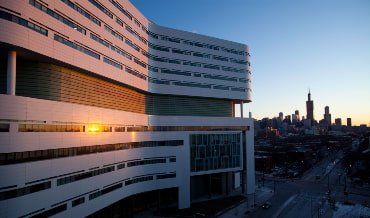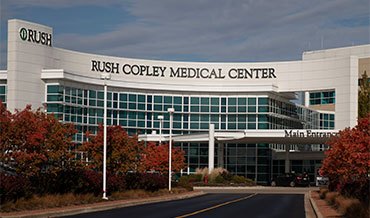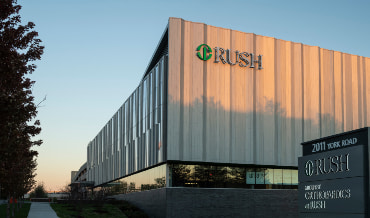Meningiomas are the most common kind of brain tumor — accounting for about 15% of all brain tumors — and most are treatable. These slow-growing tumors often are benign and can be removed surgically.
Symptoms of a Meningioma Brain Tumor
- Headaches
- Weakness in an arm or leg
- Seizures
- Sensory changes
- Impaired brain function
Meningioma Treatment at Rush
Your first step of treatment will be the diagnosis. Your doctor may recommend one of the following tests to determine if you have a meningioma and to treat your brain tumor:
- Monitoring: For noncancerous meningiomas that are not causing symptoms, your doctor may recommend a wait-and-see approach. If the tumor grows and starts to create problems, it may need to be surgically removed.
- CT scan: A CT scan (or computed tomography scan) is an imaging procedure that uses a combination of X-rays and computer technology to produce cross-sectional images (often called slices) of the body. A CT scan shows detailed images of your brain.
- Magnetic resonance imaging (MRI): Magnetic resonance imaging (MRI) is a diagnostic procedure that uses a combination of large magnets, radiofrequency and a computer to produce detailed images of organs and structures within the body.
- Skull base surgery: Skull base surgery is used to treat a meningioma or sinus and other skull base tumors, as well as other abnormalities near the bottom of the skull. It is performed by experienced, highly skilled skull base ENT surgeons and neurosurgeons.
- Radiation therapy: At Rush Radiotherapy we treat hard-to-reach brain tumors with the nonsurgical, minimally invasive alternative to brain surgery, TrueBeam STx, a robotic radiosurgery system.

Rush Excellence in Meningioma Treatment
- Experience that matters: Our skull base and pituitary surgery team includes highly skilled experts from more than 10 medical subspecialties who work together to provide team-based, personalized care for meningioma and a full range of skull base brain tumors. Rush is among a handful of programs that have in-depth experience with these rare tumors. In fact, only about 5% of U.S. hospitals evaluate and treat as many patients with pituitary and skull base tumors as we do here at Rush. Because of our expertise, we are able to handle even the most complex cases.
- Nationally ranked experts focused on you: U.S. News & World Report ranked Rush University Medical Center among the best in the country for neurosurgery and neurology, ENT and cancer care.
- Leading-edge treatments and research: At Rush, you will have access to advanced treatments you might not find elsewhere as part of new clinical trial testing. For instance, neuro-oncologists at Rush are studying targeted therapy according to tumor markers for people with meningiomas. Our researchers have collectively published more than 300 articles on a wide range of topics related to pituitary and skull base tumor surgery, including quality of life after skull base surgery.
- Expertise in minimally invasive treatment: Radiation oncologists at Rush treat hard-to-reach brain tumors with the nonsurgical, minimally invasive alternative to brain surgery, TrueBeam STx, a robotic radiosurgery system.
- Focused on quality of life for you and your family: The brain tumor team puts your quality of life and your family’s needs first. Our supportive oncology program offers many resources to help you and your family cope with the physical and emotional effects of a brain tumor. Social workers, therapists, nutritionists, integrative medicine specialists, chaplains and patient navigators are all available to support you through your treatment and beyond.








